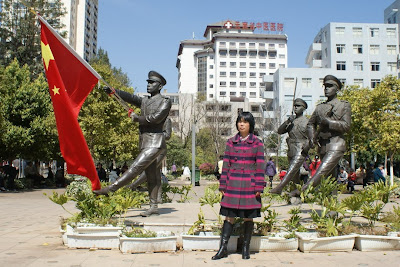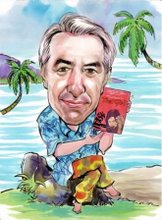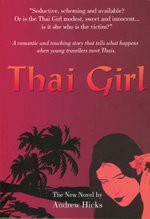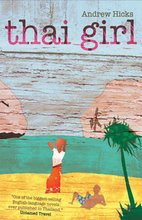
This crab wandered in and paid the price.

During the rains there's frogs and fish in the rice fields.

These tiny fish are delicious deep fried.

And this was the trap that caught them.

A spicy dish of bamboo shoot is highly prized.

But it takes much time and effort to prepare it.

Rural Thailand is changing fast, often for the better, but as always there are winners and losers. For this child, change will not come fast enough and he may have little choice but to join the cohorts of cheap labour that migrate to the cities to fuel the modern economy, thus maintaining the comfortable life-style of the middle classes. The land can no longer provide a living, except for those who own substantial farms and work hard and capably.
But it was not always that way. Once there were forests and food for free.
I’ve written before about how the Surin countryside where my wife, Cat and I now live used to be bountiful and how it abundantly yielded birds and animals to eat, roots, leaves, nuts and fruits. Her childhood was spent gathering food in the countryside and her memories of that time seem to be happy ones.
The trouble is now that every available scrap of land has been made productive and almost all the forest has gone. With increasing population, farming cannot support the population and this unlimited resource of free food for the landless is no longer there. Thus the young and fit have to move away to the cities to find low paid work, often leaving their small children with Mama Papa in the village.
I’d never before thought of Thais as hunter gatherers but rather as prosperous growers of rice, so this is a new insight for me. Farmers and pastoralists wandering the world with their cows are the wealthy ones and the hunter gatherers are all but gone. One thinks only of the pygmies in the Congo, of the Punan in Borneo and the Orang Asli or Sakai in the mountainous jungles down the spine of Malaysia.
I’ve seen people in West Africa who wore nothing but leaves but even they grew crops. I’ve stayed with Dyaks several days up the Skrang river in Sarawak, sleeping under the huge bundles of human skulls tied up with rattan. They lived off the jungle and just before we went out hunting orang utan, they showed me the paws of a bear they’d killed a few days before. They also grew a few vegetables and kept pigs that ran wild in the forest around the long houses. This was fine by me but in the absence of a WC, when I headed off into the jungle to hide behind a bush, the pigs would come running. They were so keen to get up close and personal as I squatted down that they almost knocked me flying.
The only pure hunter gatherers I’ve ever met though were the Sakai in the Taman Negara national park in Malaysia. In the vastness of the jungle we were lucky to come across them sitting in low temporary shelters of palm and leaves. They were very hospitable as they showed us how they whittled the darts for the blow pipes with which they killed monkeys and showed us the roots and the honey they’d recently collected from the jungle. They were delightful people to meet, their most precious possession being the fire that they kept glowing in one of their shelters.
I now realize to my surprise that my Thai wife too is a hunter gatherer. There’s nothing she loves doing more in the village than collecting food and despite the loss of the forests, it’s still out there if you know how to find it.
And it also comes into the house too without being asked! The garage is a cool, quiet place where we’ve caught intruding crabs and frogs, rats and even a scorpion, and all of them have gone into the pot.
Then when it rains heavily at night, the frogs cry out noisily and Cat gets up and goes out in the dark and the wet hunting them. She takes a powerful head torch and a vicious looking spear and returns with several kilos of frogs and fish in a bucket.
We’ve had heavy rain recently and the fish pond overflowed and she made a fish trap of fine netting where the water runs out. This produced quantities of beautiful small fish of the kind that are used to make plaa raa, the foul smelling fermented fish that Isaan people so love.
Then Cat takes the bamboo shoots from around the fish pond and spends ages cutting it into tiny slices and boiling it up to soften it. One dish she made recently was to mix it with rice, chopped pork, various spices and a liberal quantity of plaa raa and fiery chili to render it totally uneatable by any farang. Then it was wrapped in parcels of banana leaf to make a local delicacy that was truly a labour of love.
She also collects pak ah chet, a leaf that grows on the surface of the pond. And she gathers kee lek from behind the house which is pounded to make a bitter green paste or soup, and at a certain time of the year we go out to the rice fields and climb the sadao trees to collect the young shoots that again are cooked up to make a decent curry as bitter as bile.
Then there was the trap with a blue light that accumulates a huge quantity of insects overnight that are fried up and eaten as a snack. The rice fields are full of fish and crabs, shell fish and prawns, all there for the taking, just like at the seaside, so in some ways the countryside is still nothing less than bountiful.
Nonetheless, you have to have land as there is no longer enough to sustain the whole population of rural Isaan. And that’s why the middle generation has gone off to the towns to find menial and badly paid work.
A few days ago one of Cat’s aunties came in to show off a new grandchild that had just been left with her by her daughter who works in Bangkok. This woman had eight children of her own but with only one of them now still with her in the village, all the others having gone away to the south. She already has two small grandsons living with her, their unmarried mothers gone far away so a third is a real burden, not to mention the cost of milk formula. From time to time her family send back small sums of money her and Papa and the children but for them it’s a poor life, living in what an only be described as a shack. They have absolutely no other income.
The new child is of course a joy, but the burden for an old woman of raising yet another baby is hard. But that’s just the way it is in rural Thailand.
The comfortable middle classes in Bangkok benefit from a vast pool of cheap labour while Isaan is a totally different world.
The village is a real community, though under threat, but it’s sad if more of the benefits of the modern economy cannot be brought to the countryside. That tension is of course what the current political turmoil in Thailand has been all about.
Meanwhile Cat has her farang and a comfortable life, but I respect her passion for living off the land and for not running a mile from the toughness of her upbringing. That’s what makes living in the village more rewarding for me as Cat’s enthusiasm for country life brings me a little closer to what remains of ‘the real Thailand’.
It still leaves the question though that the countryside has been stripped bare and is no longer capable of sustaining those with little or no land. In times of trouble there is little now for them to fall back on.
Andrew Hicks The “Thai Girl” Blog December 2010
























































